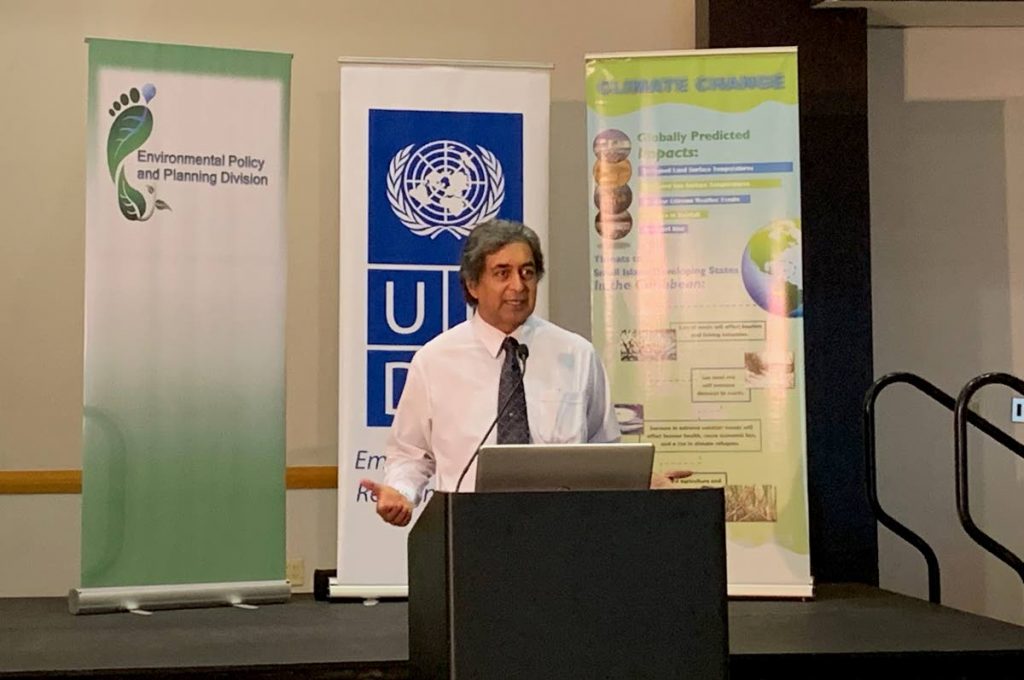Rising carbon dioxide levels causing ‘global crisis’

JORDON BRIGGS and JABARRI SUPERVILLE
“WE ARE the first set of human beings ever to breathe carbon dioxide this high,” said head of multilateral environmental agreements at the Ministry of Planning and Development Kishan Kumarsingh at a conference for sensitisation on climate change.
The conference was a three-day event held at the Hyatt Regency July 29-31. Kumarsingh spoke on climate change issues and looked at the present and potential impacts on TT and the rest of the world. His presentation was broken into three parts: what we know, what we don’t know and what we should know.
According to him, climate change is the change of a place’s natural climate; it is natural and has occurred several times over the millennia. He said it has occurred at a rate that allowed natural systems to adapt or cope over a long period of time. However, he added, there is currently a global crisis due to human-induced climate change from the excessive output of greenhouse gases like carbon dioxide.
He said the rate of climate change is now too fast to allow natural systems to adjust. In addition, the oceans have absorbed much of this increased heat, with the top 700 metres of ocean showing warming of more than 0.4 degrees Fahrenheit since 1969.
Kumarsingh described the risk of climate change and explained that its effects are going to increase in the future and the changes are accelerating more than originally expected. He gave the example of Iceland glaciers melting faster than anticipated and that, if fully melted, that could raise the global sea level by seven metres or more.
“It would also raise the global sea level above the sea level of many countries,” he said.
“We should know how to assess the risk. We should know how to manage climate risk, bearing in mind what the long-term impacts are likely to be so as to allow economic activity to continue in a sustainable manner and human and citizen well-being to be sustained at an acceptable level. The findings of that climate risk assessment revealed that the varying threats can be unpredictable,” he said.
Kumarsingh pointed out that TT is certainly at direct risk from heat waves, flooding, droughts, extreme and centralised rain. On the health impacts of climate change, he said the minimum temperature in TT used to be 22 degrees Celsius. However, it is now normally between 25 and 26 degrees Celsius, which can cause general discomfort for human beings and affect the elderly. Other risks were threat to the quality of water and the risk of leptospirosis due to flooding. He explained that this also takes an economic and social toll as the more polluted the water becomes, the higher the maintenance cost, which will affect general accessibility for the population. Kumarsingh explained that the country’s water systems are not designed to deal with constant flooding or a rotation between heavy water and drought. He said that due to the frequent droughts in TT, year-round rationing has become the norm.
“They are all linked. That’s why I keep stressing climate change has to be treated as a national issue,” he said.
Kumarsingh listed places in TT such as Salybia, Claxton Bay, Tunapuna, Penal, Siparia, Diego Martin, Speyside, Roxborough and Charoletteville as high-risk areas of climate change.
“Basically all of Trinidad and Tobago is at risk.
“The point is there are things we can do to mitigate the impacts and effects of climate change,” he said.
He touched on TT’s aim to decrease the amount of greenhouse gas emissions by 2030. The goal, Kumarsingh said, is to get a 15 per cent reduction of carbon dioxide and to reduce public transport emissions by 30 per cent.
Asked if the US leaving the Paris Agreement would influence other states to do the same, Kumarsingh said, “Climate action in the US is not driven at the federal level but at the city and state levels. (US President) Trump’s mindset will not influence or permeate the minds of those who see the trends and the presence of climate change.”
Media veteran Tony Fraser, in response to the mitigation discussion, said, “We have the possibility of dodging the more drastic effects of climate change if we do the right thing.”
Kumarsingh added, “Our first line of defence is mitigation. If you don’t mitigate then you will have greater and more catastrophic impacts and then you will have more adaptation work to do after. We need to develop in a climate-smart way.”
He believes there should be a primary focus on developing and preserving TT’s natural forms of mitigation rather than spending large sums of money to build sea walls which will be expensive to build and successfully maintain over a long period of time.
He compared sea walls to mangroves and explained that they serve the same purpose in helping against flooding and coastal erosion. He emphasised the importance of maintaining and building natural climate resilience as TT gets a natural protection from these systems.


Comments
"Rising carbon dioxide levels causing ‘global crisis’"